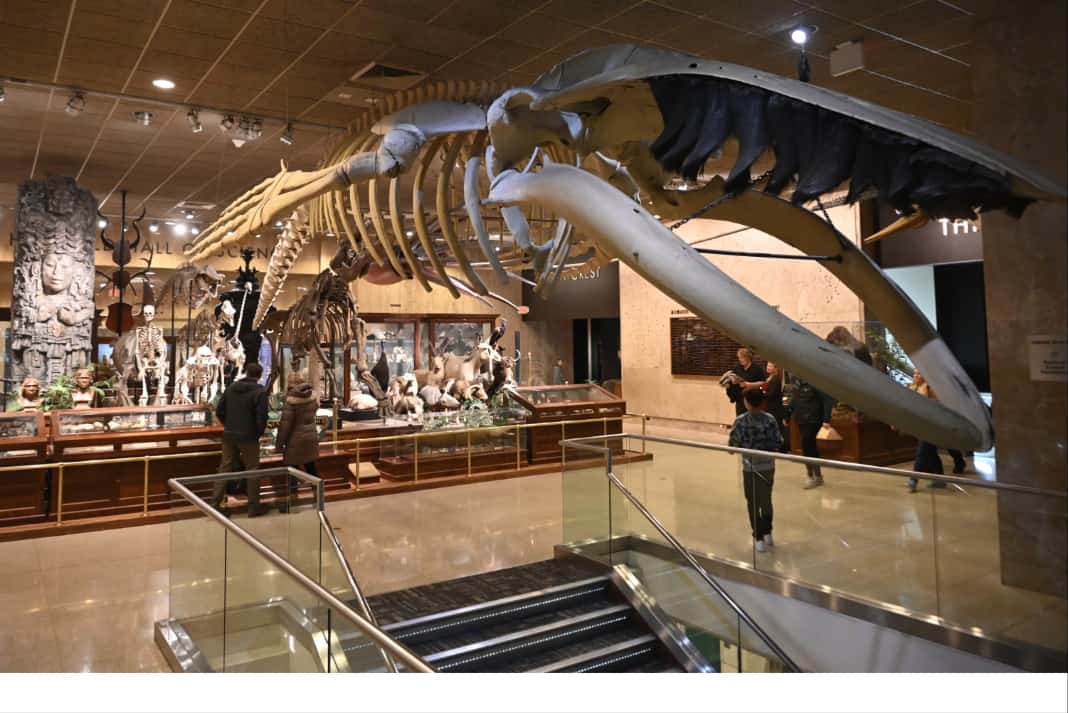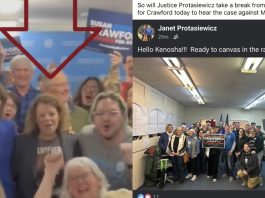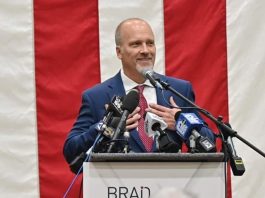Read all of our stories on the Milwaukee Public Museum here.
In a stunningly arrogant letter to the Milwaukee County Board pushing back against a citizen group that is trying to save the Milwaukee Public Museum’s exhibits and art, the museum’s CEO wrote that some of the beloved exhibits must be scrapped to meet “cultural competency” concerns.
The letter was dated Sept. 27, 2024, and addressed to Milwaukee County Supervisors. It was signed by the museum’s President and CEO Ellen Censky and Aaron Hertzberg, Executive Director of Administrative Services for Milwaukee County.
“Several of the exhibits—built in the 1960s and 1970s—have not kept current with scientific research and lack cultural competency,” they claimed.
We previously revealed that Milwaukee County Public Museum officials tacked on an additional $80-90 million to renovation cost estimates for updating exhibits in the current facility after saying that racial and equity concerns were not being met.
Learn more about the efforts of the citizen group, PreserveMKE, here. You can find them on Facebook here. The non-profit group recently picketed the museum in their efforts to save the beloved exhibits and artwork from destruction.
In the letter, museum officials admit that they don’t know what will happen to the historically significant artwork and murals in the current museum. They indicated the beloved pow wow exhibit will be no more. They also confirmed that the museum is dropping the words “Milwaukee” and “Public” out of its name, despite receiving promises of $85 million in state and county taxpayer dollars. The facility will now be known as the “Wisconsin Natural Museum.”
Although Censky and Hertzberg did not specify which exhibits they believe “lack cultural competency,” they made the comments in a section that explained that PreserveMKE is a non-profit citiizen group that is working to preserve the museum and “keep its beloved exhibits,” including “The Streets of Old Milwaukee,” “The European Village,” “The Buffalo Hunt” and “The Native Pow Wow.”
The group’s website says that those exhibits and “so many others are dear and beloved by all. We believe that the nostalgia and magic of these exhibits is irreplaceable.” The group is “committed to preserving our beloved exhibits as and where they are for future generations,” its website said.
Too bad, was the basic message of Censky’s and Hertzberg’s letter.
“In some exhibits, the scenes and props that hold the collection items are also beloved (e.g., a scene painted on a wall), but our focus is on creating a new environment in which to tell the stories of each collection item,” they wrote. For example, they are creating a new storyline around the museum’s African elephant, Timba.
“The fate of the murals in the museum has yet to be determined. Each one is unique. Some span 100 feet or more; some were painted directly onto plaster. A few were previously damaged from building leaks,” they wrote. “The museum will work directly with Milwaukee County on a plan for the murals as we get closer to vacating the current building.” [We previously wrote about a lack of transparency about what would happen to the murals.]
The officials admitted that “not all exhibits will transition to the new museum in their entirety.”
This sort of attitude doesn’t sit well with PreserveMKE, which wrote, “They (museum officials) have said many times that they are NOT going to be a history museum, which we find unacceptable. The MPM Inc leadership and board have released that little of the old museum will survive if they get their way.”
Censky and Hertzberg brushed off the group’s concerns that historic artwork and historically-significant dioramas “will be tragically lost forever.” Although far from ensuring that won’t happen, they seemed to argue it is more important to “innovate.”
“The best way to honor those past innovators is to continue to innovate and share the next innovative iteration of exhibit,” they retorted, adding, “Museums are meant to change.” They then outlined how new exhibits will include “Milwaukee Style” immersive exhibits that are regularly rotated and contain “Easter eggs” like “the famous snake button.” They didn’t explain what will happen to the snake button.
In the letter, Censky and Hertzberg wrote off the citizen group, PreserveMKE, as a “small advocacy group,” accusing them of “misunderstanding and misinformation.”
The group says it has more than 9,000 members. In the letter, Censky and Hertzberg said their responsibility is to preserve the items in the collections, not exhibits per se.
“It is the collections, not the exhibits, that we must focus on saving,” they said of the popular exhibits outlined and others, claiming that the current building’s condition is endangering them (but not explaining why the collections can’t just be stored off-site in a rehabbed current building).
“While we know change is difficult, and many people have a special attachment to the current exhibits, this is not the case for everyone,” they wrote, adding that focus groups and surveys indicated “that people feel MPM’s exhibits have remained stagnant for too long.”
The citizens’ group “would like to see an independent inspection of the building to assess its condition and shared with the Milwaukee County Board and its residents,” the letter noted.
Indeed, on its website, PreserveMKE says, “We feel that the building condition statements by MPM, Inc are just excuses to justify a new building being privately owned by the new private entity, Historic Haymarket Milwaukee (hereafter known as HHM).”
“PreserveMKE has in its possession a 17-page draft building assessment that took place over two days from 2020 that was never published,” the museum officials claimed. “As a reminder, this building is 450,000 square feet. The draft was not comprehensive, as it did not account for numerous building systems, including the substructure and superstructure.”
But they admitted using an older report. “What MPM and Milwaukee County are using as the basis for conversations about deferred maintenance and the building condition is a 718-page report from 2015, resulting from a two-month assessment of the building by the Milwaukee County Department of Administrative Services, Facilities Management Division, Facility Condition Assessment Program team and third-party consultants Thunderbird Engineering and Faith Technologies, Inc.,” they wrote. “This report, and its summary document published in 2018, detail nearly $100 million in capital and maintenance needs. Keep in mind that $100 million number is in 2015 dollars and is much higher in 2024 dollars.”
We previously explained how the museum’s maintenance estimates are, in some cases, projections well into the future and that numbers have repeatedly shifted.
PreserveMKE isn’t alone in its concerns. Four bipartisan Milwaukee County Supervisors previously raised serious concerns about the new $240 million Milwaukee Public Museum project, the project’s transparency, and the degree of public money involved.
The letter also claims if the museum loses accreditation, it would impact “the museum’s ability to host traveling exhibits and receive research grants, and most importantly, called into question the museum’s ability to care for and preserve Milwaukee County’s collections.”
See the full letter here:
We previously explained that Milwaukee Public Museum leaders have misled the public and elected officials that they would “lose the ability” to get traveling exhibits without accreditation.
They claimed that some people used for models in the Pow Wow exhibit don’t want their now deceased loved ones to be “on display in the new museum.” As for the rest of the Pow Wow exhibit? They made it clear that it will be no more, writing that the museum’s “Manager of Tribal Relations” is “working closely with the Pow Wow models and their families to determine what will happen with each figure, whether that is to be on display in another museum or cultural center or retired to a more private setting.”
According the letter, the city’s plan outlines “a new vision” for the property with the current museum building, to possibly include mixed-income housing, neighborhood supporting commercial uses and connected streets and open access to a future redeveloped MacArthur Square.”
“We learned that donors had little to no interest in contributing to a failing, government-owned building,” they wrote.
“While change is difficult for some people, especially when nostalgia is involved, public excitement for the Future Museum continues to grow as new details of the building and the exhibits emerge.”


![WATCH: Elon Musk Town Hall Rally in Green Bay [FULL Video]](https://www.wisconsinrightnow.com/wp-content/uploads/2022/04/Elon_Musk_3018710552-265x198.jpg)



![The Great American Company [Up Against the Wall]](https://www.wisconsinrightnow.com/wp-content/uploads/2025/03/MixCollage-29-Mar-2025-09-08-PM-4504-265x198.jpg)
![The Wisconsin DOJ’s ‘Unlawful’ Lawman [WRN Voices] josh kaul](https://www.wisconsinrightnow.com/wp-content/uploads/2025/03/MixCollage-29-Mar-2025-08-48-PM-2468-265x198.jpg)



![Judges vs. Trump [Up Against the Wall] Frederick Walls Trump Holds Cash Special Counsel Jack Smith Iowa Victory for Trump Remove Trump From Primary Ballot](https://www.wisconsinrightnow.com/wp-content/uploads/2023/11/trump-case-dismissed-265x198.jpg)
![The Fed Reverses Course [Up Against the Wall] the fed](https://www.wisconsinrightnow.com/wp-content/uploads/2023/07/Collage-Maker-20-Jul-2023-08-12-AM-729-265x198.jpg)